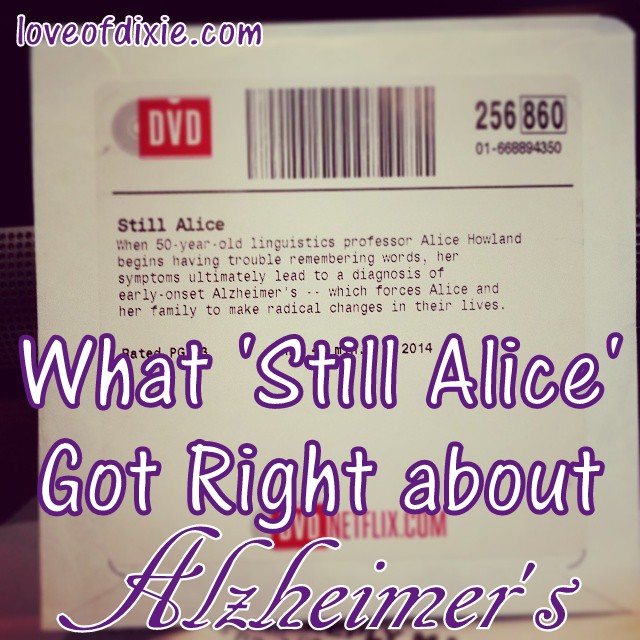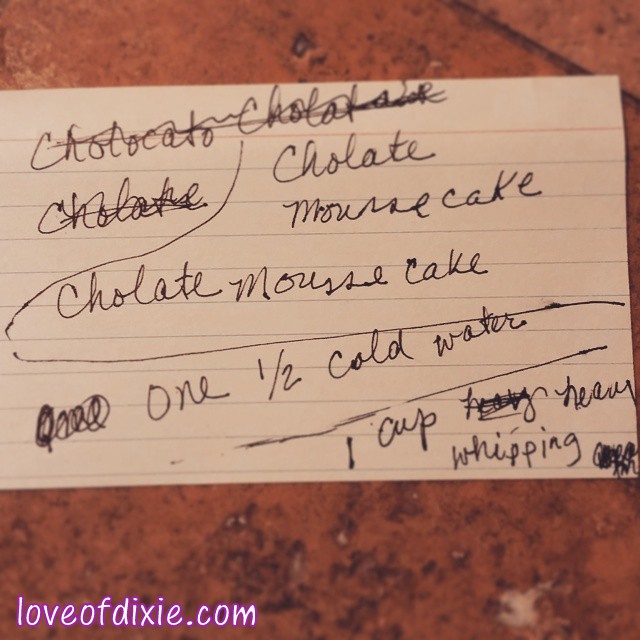What Still Alice Got Right about Alzheimer’s
I waited to watch Still Alice until it came out on video. I just couldn’t bear to sob in a movie theater, surrounded by strangers.
Since November is National Alzheimer’s Disease Awareness Month and National Family Caregivers Month, I thought it would be a good time to share with you what I think Still Alice got right about early onset Alzheimer’s disease and what I think it left out.
(And, I hate to admit this but, although I own the book by Lisa Genova, I haven’t made time to read it yet so my review of Still Alice is based strictly on the film version.)
What Still Alice got right about Alzheimer’s
For me, Still Alice hits a little too close to home.
A brilliant linguistics professor, played by Julianne Moore, is diagnosed with early onset Alzheimer’s disease at age 50. The film focuses on her relationship with her daughter and best friend, played by Kristen Stewart. Meanwhile, her firstborn daughter is having babies of her own and worried about genetics.
My own mother, a talented writer and English teacher, was diagnosed in her early 50s, already in the moderate stages of early onset Alzheimer’s disease, and passed away at age 59, while I was pregnant with my youngest child.
Still Alice‘s portrayal of Alzheimer’s disease blows the farces of previous onscreen portrayals like The Notebook and Grey’s Anatomy out of the water. It is real and honest and heartbreaking.
Julianne Moore’s acting is incredible, embodying the disoriented, frightened and vulnerable face of Alzheimer’s, in her Academy Award-winning performance as Alice.
The film begins with Alice’s struggle to find words and remember appointments and then her panic as she gets lost on a familiar jogging route.
I used to know how the mind handled language, and I could communicate what I knew. I used to be someone who knew a lot. No one asks for my opinion or advice anymore. I miss that. I used to be curious and independent and confident. I miss being sure of things. There’s no peace in being unsure of everything all the time. I miss doing everything easily. I miss being a part of what’s happening. I miss feeling wanted. I miss my life and my family. I loved my life and family. ― Lisa Genova, Still Alice
Still Alice does a great job of demonstrating the stress and chaos a family feels in the aftermath of an Alzheimer’s diagnosis.
It shows her husband’s denial about his intelligent, active and educated wife having Alzheimer’s at such a young age. It shows her adult children’s struggle to accept and cope with her diagnosis and their fears about their own chances of developing the disease. And it shows her daughter’s eventual choice to put her career on hold and become her main caregiver when her husband chooses to take a new job in another city.
Alice’s self awareness about her forgetfulness and search for a diagnosis seems a bit far fetched, since family members typically notice a problem before the Alzheimer’s patient does, but her symptoms significantly affect her ability to teach, while her husband is distracted by his own career and her children aren’t seeing her every day.
What Still Alice left out about Alzheimer’s
The film portrays the confusion of early stage Alzheimer’s but skips over the paranoia, anger and aggression of moderate stage Alzheimer’s. Alice doesn’t think people are stealing from her, she isn’t terrified of taking a shower, she doesn’t call her loved ones mean names or hit her caregiver.
Alice becomes confused but is always easily calmed. If only it were that simple.
Sadly, I think these negative behaviors were left out to keep the audience from losing any empathy with Alice. She handles every stage of her illness with grace.
Aside from wetting her pants because she can’t find the bathroom in her beach house, nothing horrifyingly embarrassing happens. She doesn’t try to take off her pants in the middle of a store, as my mom did, for instance.
The movie stops, abruptly, just as Alice is entering the end stages of the disease and losing her ability to speak. It doesn’t show her wearing diapers or being fed or laying motionless in bed.
It’s about love.
Still Alice is not the whole picture of Alzheimer’s, but it is a glimpse, and a moving glimpse at that. It’s about a mother and daughter’s emotional journey through diagnosis and decline.
I still can’t watch the final scene without crying.
It’s about love.
Love,
Lauren
P.S. Another thing Still Alice got right?
A soundtrack featuring Texas singer-songwriter Lyle Lovett’s If I Had A Boat. My mother would definitely approve.










One Comment
Comments are closed.